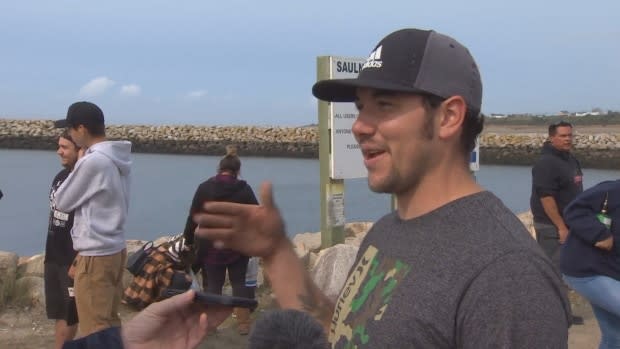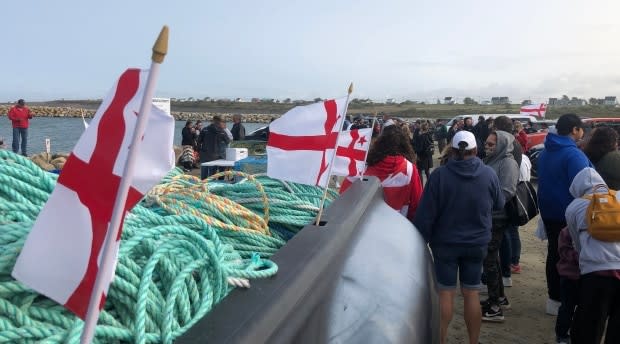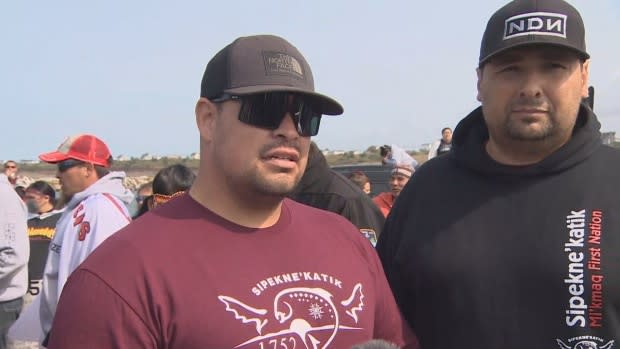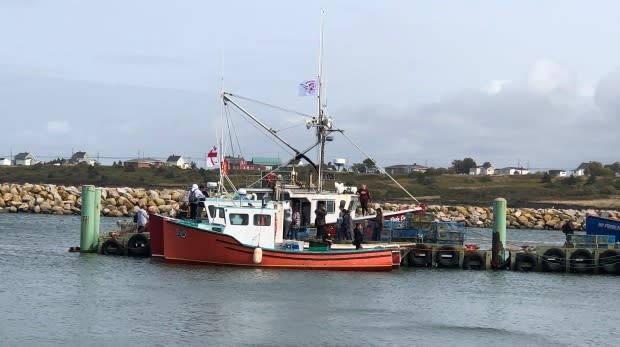Mi'kmaw fishermen launch self-regulated fishery in Lower Saulnierville
About 200 people gathered on a wharf in Lower Saulnierville, N.S., Thursday to support a First Nation's intention to launch its own moderate livelihood fishery outside of the regular lobster fishing season.
The Sipekne'katik First Nation held a ceremony to bless the fleet and distribute licences and tags before it launched the self-regulated fishery amid tensions between Indigenous and non-Indigenous fishermen in the area.
Jordan Chase was one of the first to head out on St. Marys Bay early Thursday afternoon. He said they were met in the water by a number of non-Indigenous fishermen.
"It was sort of like pepper in a bowl of water, and we were trying to make our way through it, basically," he said. "They were steaming right at us and trying to intimidate us, trying to push us away."
A release from the Assembly of Nova Scotia Mi'kmaw Chiefs said that despite the 1999 Marshall decision, which recognized the First Nations right to earn a moderate living from fishing, "exercising these rights continues to bring frustrations, conflict and hardships to our people."

The Supreme Court of Canada decision comes with a limitation: the federal government retains the authority to regulate that fishery in the public interest and for conservation.
In a statement Thursday, federal Fisheries Minister Bernadette Jordan said she was "deeply concerned about the escalating tensions in Nova Scotia's fisheries."
She said she is in communication with First Nations leadership to "find a collaborative path back to the negotiation table."
"Until an agreement is reached with DFO, there cannot be a commercial fishery outside the commercial season. A sound management framework is necessary for the management and conservation of fish stocks," the statement said.
"I want to be clear that DFO continues to address unauthorized fishing. Fishing without a licence is a violation under the Fisheries Act and anyone fishing outside the activities authorized under a licence may be subject to enforcement action."

Chief Terrence Paul, fisheries lead for the Assembly of Nova Scotia Mi'kmaw Chiefs, said there have been attempts for years to negotiate a deal with the Department of Fisheries and Oceans.
"Through consultation, we hope to find a path forward immediately," he said. "Our communities are going fishing and we want to ensure that they don't have to be fearful of being harassed or charged."
'If this goes to court, we'll be there'
"It's just heartwarming to see so many people that are here to fight for the same thing," Sipekne'katik Chief Michael Sack said to a large crowd ahead of the boat launch.
"If this goes to court, we'll be there."
The chief noted that Thursday marked the anniversary of the Marshall decision, and awarded the first fishing licence to Randy Sack, the son of Donald Marshall Jr., the Mik'maw fisherman at the centre of the Supreme Court case.
"My dad would be proud right now," said Randy Sack. "I'm feeling pretty good."

Five licences were issued Thursday, each allowing the setting of 50 traps.
According to a release from the Sipekne'katik First Nation, previous discussions with DFO have been unsuccessful so far due to a lack of shared understanding about what a "moderate livelihood" means.
It said the Sipekne'katik chief and council have decided to operate a "phased approach" to the livelihood fishery to determine how much interest there is in livelihood fishing in the community, what constitutes a "livelihood," and what fishing efforts are needed to produce a moderate livelihood for people who fish.
"As in any new entrance into a fishery, some fishers may harvest more than a moderate livelihood, while others may harvest less. This is intentional," the release said.
"The effect of this phased approach to our fishery on a commercial lobster industry that lands sixty million pounds of catch is insignificant."
On Tuesday morning, hundreds of non-Indigenous commercial fishermen set up lobster-trap blockades in Saulnierville and later in Weymouth in the province's southwest to protest what they said were illegal fisheries in St. Marys Bay.
Sack, the chief of Sipekne'katik, said Thursday that their problem was not with the non-Indigenous fishermen.
"We have an issue with the levels of government that are not upholding our rights," he said.
He said some fishing equipment was vandalized Thursday, something that was "expected."

In a statement, Colin Sproul of the Bay of Fundy Inshore Fishermen's Association said the First Nation issuing its own fishing licences is "not based in Canadian law."
He would not confirm whether any vandalism took place, but said: "In the absence of law and order good people can be forced to take the law into their own hands and the responsibility for that falls squarely on Minister Jordan and her predecessors who have not enforced the rules."
Sack also said the First Nation was looking to issue their own buyers' licences so the catch can go to market.
Nova Scotia Fisheries Minister Keith Colwell warned Thursday that only commercial buyers who are provincially licenced should be buying lobsters.
MORE TOP STORIES


